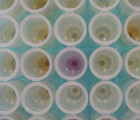Tyrosine kinase inhibitors (TKIs) have revolutionized the treatment of chronic myeloid leukemia (CML). Although randomized evidence demonstrates that imatinib (a commercially available TKI) prolongs event-free survival in patients with CML, some patients develop imatinib intolerance or resistance. In addition, imatinib is less effective in patients who have progressed to more advanced disease stages, such as accelerated phase and blastic phase CML. For these reasons, 2nd generation TKIs that can inhibit the BCR-ABL protein more effectively or target additional disease mechanisms have been developed. Two such drugs have also been approved for clinical use by the FDA, nilotinib and dasatinib. Resistance to TKI treatment is thought to be mediated through various mechanisms, the most common of which is BCR-ABL1 mutations. Testing for mutations in BCR-ABL1 may predict lack of response to imatinib or may inform the choice between alternative TKIs.
Abacavir is a nucleoside reverse transcriptase inhibitor used for combination antiretroviral therapy for treating human immunodeficiency virus (HIV) infection. An adverse effect from abacavir is a treatment-limiting hypersensitivity reaction, which can be severe and potentially life-threatening. Abacavir-induced hypersensitivity reaction has been associated with the presence of the major histocompatibility complex class I allele HLA-B*5701. A screening test for the HLA-B*5701 allele can assist clinicians to identify patients who are at risk of developing a hypersensitivity reaction to abacavir.
Worldwide, lung cancer accounts for approximately 1 million deaths each year, making it the most common cause of cancer-related mortality. Non-small cell lung cancer (NSCLC) accounts for approximately 85% of lung cancer cases and is often associated with a relatively poor prognosis. The majority of NSCLC patients present with advanced disease and have an average 5-year survival rate of 5%. Currently, the standard of care for NSCLC includes treatment with a platinum-based chemotherapy regimen. However, not all patients benefit equally from such treatment. Therefore, recent pharmacogenomic studies have been performed in order to identify specific biomarkers that may allow for patient-tailored treatment strategies. One such biomarker is expression of the excision repair cross-complementation group 1 protein, ERCC1.
Coronary artery disease (CAD) is a leading cause of death worldwide and in the United States it is responsible for more than 500,000 deaths each year. Genome-wide association studies (GWAS) have revealed connections between a number of common single nucleotide polymorphisms (SNPs) and CAD and other cardiovascular diseases. The p.Trp719Arg SNP in the kinesin-like family 6 (KIF6) gene has recently been reported as a potential risk factor for CAD as well as a predictor of response to statin therapy.
Colon and rectal cancer (CRC) are the third most common cancer in the United States and cause approximately 50,000 deaths per year. The anti-epidermal growth factor receptor (EGFR) monoclonal antibodies cetuximab (Erbitux®) and panitumumab (Vectibix®) have been recently introduced to treat CRC. However, the response rate with these agents is low and they are associated with serious adverse effects. Accordingly biomarkers that can predict those patients that will respond to treatment may have clinical utility. The p.Val600Glu sequence variant (often called V600E) in the BRAF gene has been investigated as a biomarker to predict patients that will not respond to treatment with the anti-EGFR monoclonal antibodies.
It is estimated that approximately 22,000 Americans will be diagnosed with tumor of the brain or nervous system in 2010. Among primary brain tumors, approximately 60% are gliomas, the most common and most malignant of which is glioblastoma multiforme (GBM).The DecisionDx-GBM test is a multigene expression assay that is designed to predict which patients are likely to experience long-term (> 2 years) progression-free survival.
Tamoxifen, a selective estrogen receptor modulator, is the standard of care for premenopausal women with estrogen or progesterone receptor-positive breast cancer and a valid option for treating post-menopausal women. However, a substantial number of tamoxifen-treated patients relapse following surgical resection, while others remain disease-free for many years. It appears that the primary effectors of tamoxifen activity are its active metabolites, rather than tamoxifen itself. Cytochrome P450 (CYP) enzymes, CYP2D6 in particular, play a major role in the metabolism of tamoxifen to active metabolites. More than 75 germline CYP2D6 variants have been identified.
A test predicting lack of response to tamoxifen could supplement information used by clinicians and patients in treatment decision-making. For example, physicians and patients may opt to switch to an alternative therapy upfront.
Genetic Testing for CYP450 Polymorphisms to Predict Response to Clopidogrel: current evidence and test availability
Application: Pharmacogenomics
The anti-platelet agent clopidogrel bisulfate (sold under the trade name Plavix in the United States) is a widely prescribed medication for the prevention of blood clots in patients with acute coronary syndrome, in those who have suffered other cardiovascular disease-related events such as ischemic stroke, and in patients who are undergoing percutaneous coronary intervention. Response to clopidogrel varies substantially due to genetic and acquired factors. Patients who experience recurrent cardiovascular ischemic or thrombotic events while taking clopidogrel are typically described as non-responsive or resistant.
The drug’s oxidation is mainly dependent on the cytochrome P450 enzyme 2C19 (CYP2C19). Patients with certain genetic variants in CYP2C19 have been found to have lower levels of the active metabolite, less platelet inhibition, and greater risk of major adverse cardiovascular events such as heart attack, stroke, and death. Testing for CYP2C19 polymorphisms may identify patients who will not respond adequately to the standard clopidogrel regimen and who should, consequently, be given an alternate treatment strategy. This article outlines the evidence concerning pharmacogenetic testing for clopidogrel response, including data on clinical validity and clinical utility, and summarizes the currently available tests marketed for this purpose.
Testing of VKORC1 and CYP2C9 alleles to guide warfarin dosing
Test Category: Pharmacogenomic (Treatment)
Warfarin is an oral anticoagulant that is widely prescribed to prevent thromboembolic events in persons at increased risk. The optimal dose is difficult to establish because it can vary 10-fold among individuals due to clinical and demographic factors. Testing for variants of the vitamin K epoxide reductase complex 1 (VKORC1) and cytochrome P450 2C9 (CYP2C9) genes has been proposed for use in guiding the initial dose of warfarin, thus achieving optimal dosing more quickly and with lower risk of bleeding.
KRAS mutational analysis for colorectal cancer
Application: Pharmacogenomic
KRAS mutational analysis is a genetic test used in clinical practice for determining the status of the KRAS gene (wild type or mutant) in tumors from patients with metastatic colorectal cancer (CRC). Persons whose tumors are wild type may respond to therapies cetuximab (Erbitux) or panitumumab (Vectibix).



